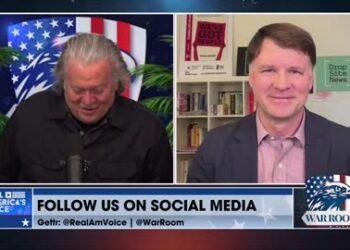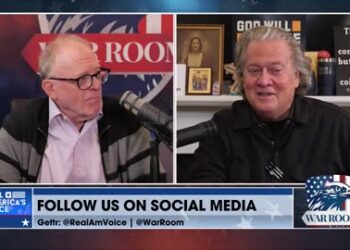In a pre-recorded Independence Day special of his WarRoom show, Steve Bannon, on the brink of his incarceration for defying Congress, offered a compelling commentary on America’s foundational conflicts and the distinctive American spirit. Speaking with author Patrick K. O’Donnell, Bannon delivered a two-hour interview rich with historical reflections and critical insights into the nation’s past and present.
Bannon began by emphasizing the intensity and complexity of America’s early conflicts. “These were hard-fought kinetic wars, and you had debates and negotiations. You had all of that, but you must look at it because so many people have forgotten,” he said.
He reminded listeners that the Revolutionary and Civil Wars were determined on the battlefield, in political gatherings, and even in the British Commons.
Reflecting on the unique American spirit, Bannon quoted Benjamin Franklin: “Franklin said about Americans: ‘We’re not British anymore. We’ve created something here in this new experience. That’s different. It’s rougher. It’s got more grit.'” He highlighted that Americans fundamentally differ from their British ancestors, showcasing a resilience and tenacity forged through struggle and perseverance.
Bannon stressed the importance of understanding the true struggles behind America’s foundation. “Look, I’d love the fact that you’re at the beach, you know, the Jaws movie was about the Fourth of July weekend. You’re going to baseball doubleheaders, hot dogs, the backyard barbecue, all of it, but so many people protecting the younger generation think, ‘Well, hey, they came out and, you know, negotiated this great thing and wrote this great document and spoke to all mankind.'” He underscored that the ideals of freedom and liberty that define America were hard-won and continue to shape the world.
In his discussion, Bannon paid homage to historical figures such as Robert E. Lee, Ulysses S. Grant, General Crook, and President Lincoln, noting their pivotal roles in shaping American history. He pointed to significant moments like the “American Thermopylae” in Brooklyn, where a small group’s defense allowed the Continental Army to survive a critical juncture. Bannon lamented the lack of recognition for these historical sites in Brooklyn and Manhattan, emphasizing the need for commemoration.
Bannon made several critical points about American history and the Revolutionary War:
Bravery and Sacrifice: Bannon emphasized the incredible bravery and sacrifice of the American Revolutionary War heroes, who faced the constant threat of hanging by the British. He highlighted their willingness to risk everything for the cause of freedom.
Unmarked Graves: Bannon lamented that many of these heroic figures are buried in unmarked graves, with their exact locations often unknown or obscured by modern developments like parking lots or taverns in Brooklyn. This serves as a poignant reminder of their forgotten sacrifices.
Overlooked Heroes: Bannon criticized the lack of recognition in popular culture for these lesser-known heroes of the Revolution, apart from figures like Washington and other notable leaders.
During his discussion with O’Donnell, Bannon underscored the gravity of the debates among the American patriots. “This was about life or death. They were talking about an imperial power that had the finest Navy and a professional army,” he stated. He highlighted the British response with a massive expeditionary force, including Hessians, aimed at quashing the rebellion: “They sent over the most massive expeditionary force in mankind’s history at that time.”
Bannon discussed British tactics, drawing parallels to their responses in Ireland and their harsh measures like collective punishment: “They had collective punishments like the Boston Port Act, closing the port and throwing thousands out of work.” He underscored the escalating tensions leading up to the Revolution and the colonial response to British actions: “Each British action further alienated the colonies and escalated the conflict.”
Bannon contextualized the Revolutionary War as a military conflict and a political struggle: “The Revolution wasn’t just fought on the battlefield but in political gatherings and debates.”
He portrayed the American Revolution as a pivotal moment in history, where negotiation was insufficient in the face of British oppression, necessitating a fight for liberty and independence through military means.
Bannon’s reflections delve into the foundational ethos of American history, emphasizing that the nation’s achievements and values have been hard-won through perseverance and sacrifice. He expressed disappointment in the lack of commemoration for lesser-known but vital events in American history, suggesting a need to elevate awareness and appreciation for these historic battlegrounds.
Throughout his remarks, Bannon emphasized the ongoing relevance of these historical lessons, urging his audience to remember and honor the grit and determination of past generations. He extended this sentiment to contemporary challenges, urging resilience and a refusal to quit in the face of adversity, echoing the spirit encapsulated in the “Battle Hymn of the Republic,” which celebrates endurance and steadfastness in pursuit of freedom and justice.
Bannon also recommended cultural and educational resources to deepen the understanding of American history. He suggested watching the series “John Adams” to grasp the intensity and educational value of historical debates and events. He mentioned Patrick K. O’Donnell’s books as essential for understanding American combat history, noting that they are informative yet engaging as they read like novels. Additionally, he referenced “The Battle Hymn of the Republic” as one of his favorite songs, emphasizing its significance in American history and its theme of perseverance and sacrifice.
A critical quote from Bannon encapsulates the theme of sacrifice and perseverance in American history: “Anything of value in this country has not been handed to people. It’s been fought for.”
This statement underscores his belief in the hard-won nature of American achievements and the importance of recognizing historical sacrifices.
Bannon’s reflections on American history and spirit serve as a powerful reminder of the nation’s enduring values and the struggles that have shaped its identity. His emphasis on bravery, sacrifice, and resilience provides a compelling narrative that urges contemporary Americans to honor and uphold the legacy of their forebears.
For more context, read Thursday’s show notes and watch the full program:






Putting Steve Bannon in prison for 4 mos right before Independence Day is the Regime just spitting in the face of America and all we stand for as citizens. Refusing to appear before a bogus Congressional committee has been elevated to a crime punishable by imprisonment to muzzle Bannon and discourage his legions of supporters. “It’s the final scream of a dying Regime” as Bannon would say. Every day he spends in prison is another nail in their coffin and the MAGA MOVEMENT grows stronger than ever! Nov 5 cannot come soon enough…